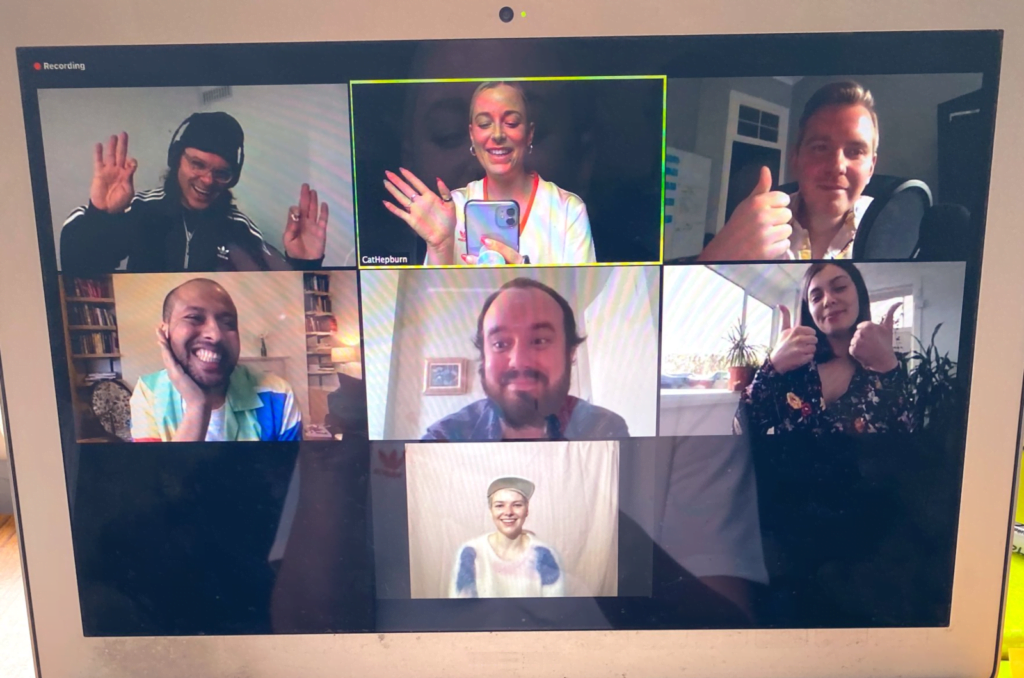 I’m forever banging out about how poetry can – and should – be the most accessible art-form. In terms of ‘consuming’ it, there are fewer barriers in place: in print, there are only the words, and in performance, there are only the words and the delivery.
I’m forever banging out about how poetry can – and should – be the most accessible art-form. In terms of ‘consuming’ it, there are fewer barriers in place: in print, there are only the words, and in performance, there are only the words and the delivery.
And in terms of creating it, all you really need to be able to do is speak. Being able to read and write is a massive help, but not strictly essential. And that’s it. Job’s a good ‘un.
It doesn’t in any way shape or form guarantee that you’ll be good at it – even the most talented poets in the world took years to develop their craft. But as an entry point, I would argue that it’s the most accessible. It’s far easier to spontaneously regurgitate a couple of verses on your phone than it is to strum a couple of chords or leave a couple of brushstrokes.
I’m also forever banging on about how the UK’s spoken word poetry scene is booming. It is, and it has been for the best part of a decade. There are regular spoken word poetry nights in pretty-much every major city and many minor ones as well: from Southampton to Aberdeen and tonnes in between.
But that’s working on the assumption that you live in or near a city. And then working on the further assumption that even if you do live in or near a city, you have the disposable time and income to be able to attend these nights, the means to get there and back, the physical health and energy to do so on a regular basis, and probably a pal or two who tick all of those boxes as well. It’s a luxury that most of us take for granted.
So, what happens when these nights are impossible to stage? What happens when all the theatres, pubs, bars, cafes and libraries are closed, and these nights are all cancelled and postponed indefinitely? Does the spoken word poetry scene vanish without a trace – unable to survive without the buzz of a busy room and the promise of a couple scoops whilst the PA is being packed away? Well, the short and rather obvious answer is no.
And by suddenly being forced to innovate and move online, the UK’s spoken word poetry scene is now infinitely more accessible than it was before. The only glaring exception to this is live subtitles for those who are deaf or hard of hearing, but I’m hoping that as time goes on, we can find a solution for that as well.
On Wednesday 8 April, my better half Maria Ferguson was supposed to be launching her debut poetry collection at The Roebuck in South London. She would’ve filled the room, and a lot of her close friends and poetry colleagues would’ve been there, and it would’ve been a top night. But now that she’s doing the launch live on Burning Eye’s Instagram instead, her folks will be able to watch from Cornwall. Her sister and her partner will be able to watch from Berkshire. My folks and sister will be able to watch from West Yorkshire. And so-on and so forth…
The other night, we did a Stay Home For Labour gig on Zoom (usually known as Stand Up For Labour), and as well as having acts from around the UK on the bill – from Plymouth to Middlesbrough – we also had a surprise appearance from our outgoing leader Jeremy Corbyn. Now to be fair to Jezza, he’s definitely attended SU4L events in the past, but he’s far less likely to spontaneously nip out to a working men’s club in Colchester or Chesterfield on a quiet Wednesday night than he is to login to Zoom. And we had messages of support from CLPs around the country as well. Except for maybe the party conference in September, it’s practically unheard of that so many of us can get together at the same time.
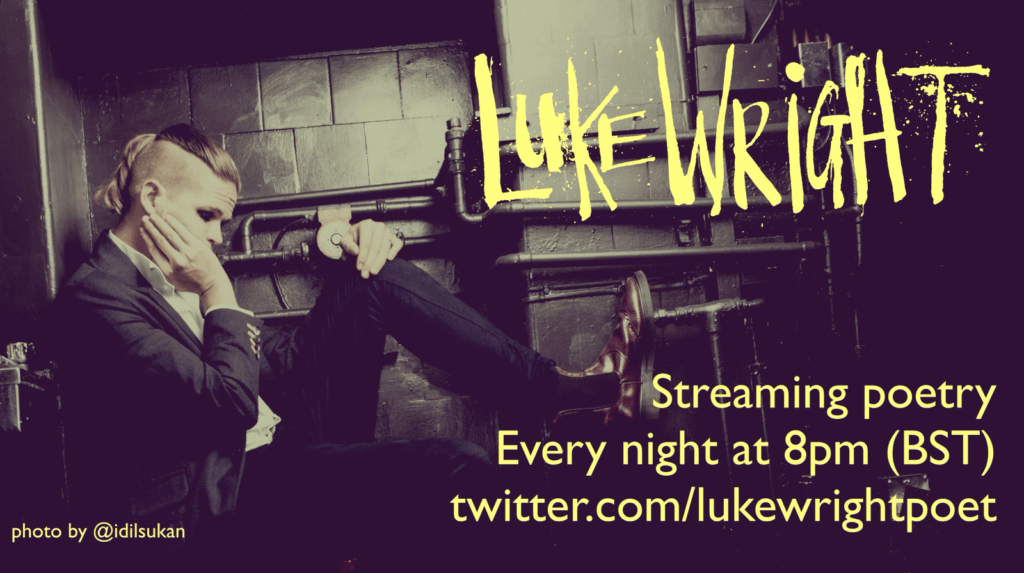
Luke Wright, one of the busiest poets in the UK by far, has taken to performing live on Twitter every night at 8pm, and is determined to do so every single night until the theatres reopen. He very openly admitted that he simply can’t get by without the thrill of performing, and he’s been attracting viewers in the thousands.
It does have its minor drawbacks, mind. Last night (Thursday 2 April), there were at least three online events that I was keen on watching. Louise Fazackerley was performing for Liverpool-based night A Lovely Word; Glasgow-based Sonnet Youth were streaming a live event on Facebook; and of course, Suffolk-based Mr Wright was in the saddle. Obviously in normal circumstances, there’d be over 200 miles between each gig, but when they’re all online, it’s Clash Central. But if the principal drawback is too many events to choose from, then I can live with that for a while.
On a personal note, the current lockdown means that the final two ‘LIVEwire’ events in this series have been postponed indefinitely. This is a project that I started planning in December 2018 – nearly a year before the first event took place in Manchester in September – so obviously it’s a bit of a blow. But it has made me think a lot more about Nymphs & Thugs and where I should be channelling my energy. It’s all well and good filling theatres in Manchester, Bristol, Birmingham and (hopefully) Colchester, and running a regular night in Leeds. But that’s five places in the country.
We have an embarrassment of riches at our immediate disposal in terms of social media and technology. So, if poetry really is for the people – and we want to reach as many people as possible – maybe this forced online revolution is exactly what poetry needed. I know folk who wouldn’t be seen dead in a theatre, regardless of the event, simply because it’s “not for them”. But they might give it a chance on Facebook. Who knows? It’s gotta be worth a shot.
Matt Abbott is a poet, educator and activist from Wakefield. He formed the UK’s leading spoken word record label Nymphs & Thugs in 2015 and fronts indie band Skint & Demoralised. His debut poetry collection Two Little Ducks was published by VERVE Poetry Press in 2018 and his debut kids’ poetry collection A Hurricane in my Head was published by Bloomsbury in 2019. He also co-hosts Roaring 20s Radio on Soho Radio and is a new contributor to The Football Pink.
Filed under: Written & Spoken Word
Tagged with: accessible, gig, innovate, Jeremy Corbyn, labour, leeds, live, LIVEWire, London, Louise Fazackerley, Luke Wright, Maria Ferguson, Matt Abbott, online, performance, poetry, Revolution, Sonnet Youth, spoken word
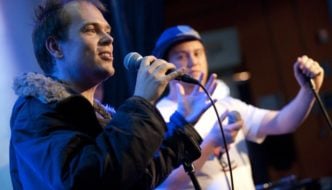
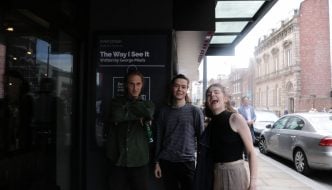
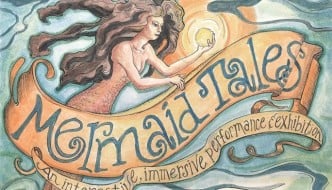
Comments